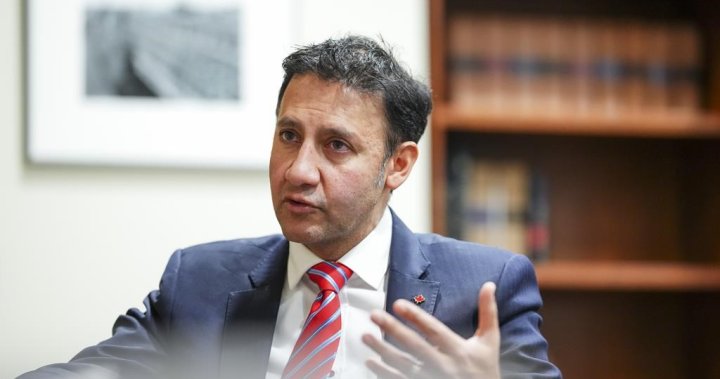The federal Liberals face a choice early in 2024.
They can allow a sunset clause to take effect so that eligibility for medical assistance in dying expands to adults whose only reason for seeking it is a mental disorder.
Or they can do what they did in 2023 and postpone it further, even indefinitely.
Justice Minister Arif Virani says the government is weighing its options as the March deadline looms.
The first step, he says, will be to see what members of Parliament and senators recommend after committee hearings that probed the issue this past fall.
To find answers, The Canadian Press spoke with many of the medical and legal experts who participated in that process.
Here are five questions that strike at the heart of the debate.
Assessors and providers of medical assistance in dying, as well as medical regulators, say they are ready for eligibility to be widened.
“Our hope is that government will not be influenced by the concern that the regulators will not be ready,” says Gus Grant, the CEO and registrar of Nova Scotia’s College of Physicians and Surgeons.
Since medical assistance in dying became legal in 2016, many voices have sounded the alarm about whether the medical profession was ready to handle changes.
“Those voices proved to be wrong at each occasion,” Grant, who is also a past president of the Federation of Medical Regulatory Authorities of Canada, said in an interview.
“The medical regulators and the involved health-care professionals were ready.”
The argument that the system can’t handle change usually comes from those who would rather not see the program expand at all, Grant and others said. It also ignores the reality that some patients with mental illness can already access assisted dying if they have other medical conditions.
“It’s a bit like Lucy and Charlie Brown and the football, right?” said Jocelyn Downie, a professor at Halifax’s Dalhousie University
“You put the football down, ‘OK, we’re gonna get this ready, boom.’ And then the next time, the football gets pulled out from under you.”
Sonu Gaind, chief of the Sunnybrook Health Sciences Centre’s psychiatry department and a University of Toronto professor, is among those asking the government to pause its expansion plans and “re-evaluate how we got here.”
There are questions that are “nowhere” close to being addressed, he said, such as how practitioners can assess factors such as poverty and whether someone suffering with a mental disorder can get better or not.
“Does it mean if you’ve had decades of suffering from an illness, and you’ve tried things, and nothing has helped? Is that what it means?” he said.
“Or does it mean that you’re suffering now, and you live in a rural community, Indigenous population, and you can’t get access to care, and society is not willing to provide you access to care?”
Conservative MP Ed Fast cited a lack of expert consensus on whether the expansion should go ahead when he asked the House of Commons to change the Criminal Code to say a mental disorder is not listed as a “grievous and irremediable medical condition” under the assisted dying regime.
Get the latest Health IQ news.
Sent to your email, every week.
Fast’s private member’s bill ultimately failed, but MPs and senators who sat on the special joint committee saw the divide for themselves.
“There’s too much controversy,” said Jitender Sareen, a physician at the University of Manitoba’s psychiatry department.
Many psychiatrists are opposed to assisted dying for people who only have a mental illness, he said, and organizations such as the Canadian Mental Health Association and the Canadian Association of Suicide Prevention have raised concerns about it.
The hearings revealed the “significant amount of concern among psychiatrists,” said Sareen, who suggested the government should instead focus on better access to mental health care.

Stefanie Green, one of the first doctors to provide medical assistance in dying after it was legalized, said in an email that the public, clinicians and academics have a right to disagree with the expansion, but that does not mean Canada shouldn’t go ahead.
She told the committee that other medical practices are available despite a lack of consensus, such hormone replacement therapy for women experiencing menopause and supervised injection sites for drug users.
Provinces are also split.
While New Brunswick says it’s working to ensure it is ready and a spokesperson for Ontario’s Health Ministry cited no concerns, Quebec passed a law in June excluding adults from accessing a medically assisted death solely for a mental disorder.
A Saskatchewan government spokesman said it, too, is concerned with the planned expansion and “cannot commit” to implementing it “without carefully considering the risk that this may pose to people suffering from mental illness.”
Has the issue been studied enough?
In 2021, Parliament passed an updated version of its medical assistance in dying law that expanded eligibility to people who only have a mental illness, and included a two-year sunset clause before it would take effect.
The government struck an expert panel to probe whether more safeguards were needed and to make recommendations around assessments.
The panel’s final report in May 2022 recommended the government develop practice standards but suggested no more legislative changes. The report didn’t wade into the question of whether or not the expansion should happen at all, and its seven-month time frame inhibited wide consultation.
Gaind and others warn that the scope was too narrow, and there has been too little scrutiny on how this part of the law came to be.
The 2021 bill was prompted by a 2019 Quebec Superior Court decision that found it was unconstitutional to require that an individual’s death needed to be reasonably foreseeable to be eligible for assisted dying.
The bill didn’t initially expand eligibility to those who only have a mental disorder. The Senate added that provision in an amendment that the government decided to approve.
Early this year, Parliament passed legislation to add just one more year to the sunset clause, so that the provision would take effect in March 2024, with Liberals saying more time was needed to get the system ready.
Trudo Lemmens, a University of Toronto professor in health policy and law, said he believes the government is moving too rapidly and ought to undertake a more careful study. He added the recent committee hearings were too short and at times overly combative.
“I understand that they felt obliged to be to be fast because the (March) date is coming up so quickly.”
What happens if there is another delay?
In a recent interview with The Canadian Press, Virani expressed openness to adding more time to the sunset clause delaying the expansion in eligibility.
But in the meantime, those who say it is time to proceed say people are in severe pain as they wait to see what happens.
Mona Gupta, a psychiatrist at the Universite de Montreal who chaired the government’s expert panel, said she is concerned about the message the conversation has sent to people with mental disorders, their families and all of society “about the status of people with mental disorders, about the way in which their rights can be considered to be optional.”

Downie made the point that another pause could mean that the expansion never happens. Conservative Leader Pierre Poilievre has vowed to scrap it if he forms the next government, and a federal election must take place no later than fall 2025.
If eligibility is further delayed or banned outright, she said the government would likely be taken to court.
“The very individuals who are … enduring an intolerable suffering, they have to go to court and force the government to do what the (Charter of Rights and Freedoms) demands of it,” Downie said.
Could a ban be challenged?
When they amended the updated assisted dying legislation, senators said they believed excluding people with mental disorders from eligibility amounted to discrimination under the Charter.
Critics say no court or law is currently forcing the government’s hand on this issue.
Lemmens, along with a host of other law professors across the country, issued an open letter early this year saying it is “reckless” to suggest that a constitutional right to assisted dying for such patients would be recognized by the courts.
“In fact, there is for that reason on the contrary a strong argument to be made that the Charter requires adequate and equal protection against premature death of all persons with disabilities,” the letter read.
Lemmens said he hopes the committee acknowledges in its report, which the Liberals say will inform their next steps, that there are constitutional law experts who assert “there is no clear constitutional obligation” for a further expansion into mental illness.
Still, others warn that future court challenges are inevitable.
Shelley Birenbaum of the Canadian Bar Association said people with mental illnesses are entitled to the same “autonomy and self-determination” when it comes to their health as those suffering from a physical illness.
“A total exclusion for all persons suffering from mental illness as a sole underlying condition is likely to be constitutionally challenged as violating the equality, security and liberty guarantees in the Canadian Charter of Rights and Freedoms,” said the Toronto lawyer, who chaired the association’s end-of-life working group.
This report by The Canadian Press was first published Dec. 27, 2023.




